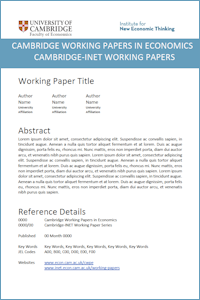
Gallo, E. and Yan, C.
Efficiency and equilibrium in network games: An experiment
CWPE1546
Abstract: The tension between efficiency and equilibrium is a central feature of economic systems. In many
contexts, social networks mediate this trade-off: an individual's network position determines equilibrium
play, and social relations allow coordination on an efficient norm. We examine this trade-o
in a network game with a unique Nash equilibrium, but such that agents can achieve a higher payoff by
following a "collaborative norm". Subjects establish and maintain a collaborative norm in the circle, but
the norm weakens with the introduction of one asymmetric node in the wheel. In complex and
asymmetric networks of 15 and 21 nodes, the norm disappears and subjects' play converges to Nash on
every node. We provide evidence that subjects base their decisions on their degree, rather than the
overall network structure. Methodologically, the paper shows the capabilities of UbiquityLab: a novel
platform to conduct interactive experiments online with a large number of participants.
Keywords: Network, network game, online experiment, strategic complements.
JEL Codes: C99 D03 D85 Z13
Author links: Edoardo Gallo
PDF: https://www.econ.cam.ac.uk/research-files/repec/cam/pdf/cwpe1546.pdf 
Open Access Link: https://doi.org/10.17863/CAM.5776
Keynes Fund Project(s):
UbiquityLab: A Platform for Large-Scale Online Experiments with Real-Time Interactions Among Participants * (JHLK)
Social Networks Structure and Economic Outcomes (JHLF)
